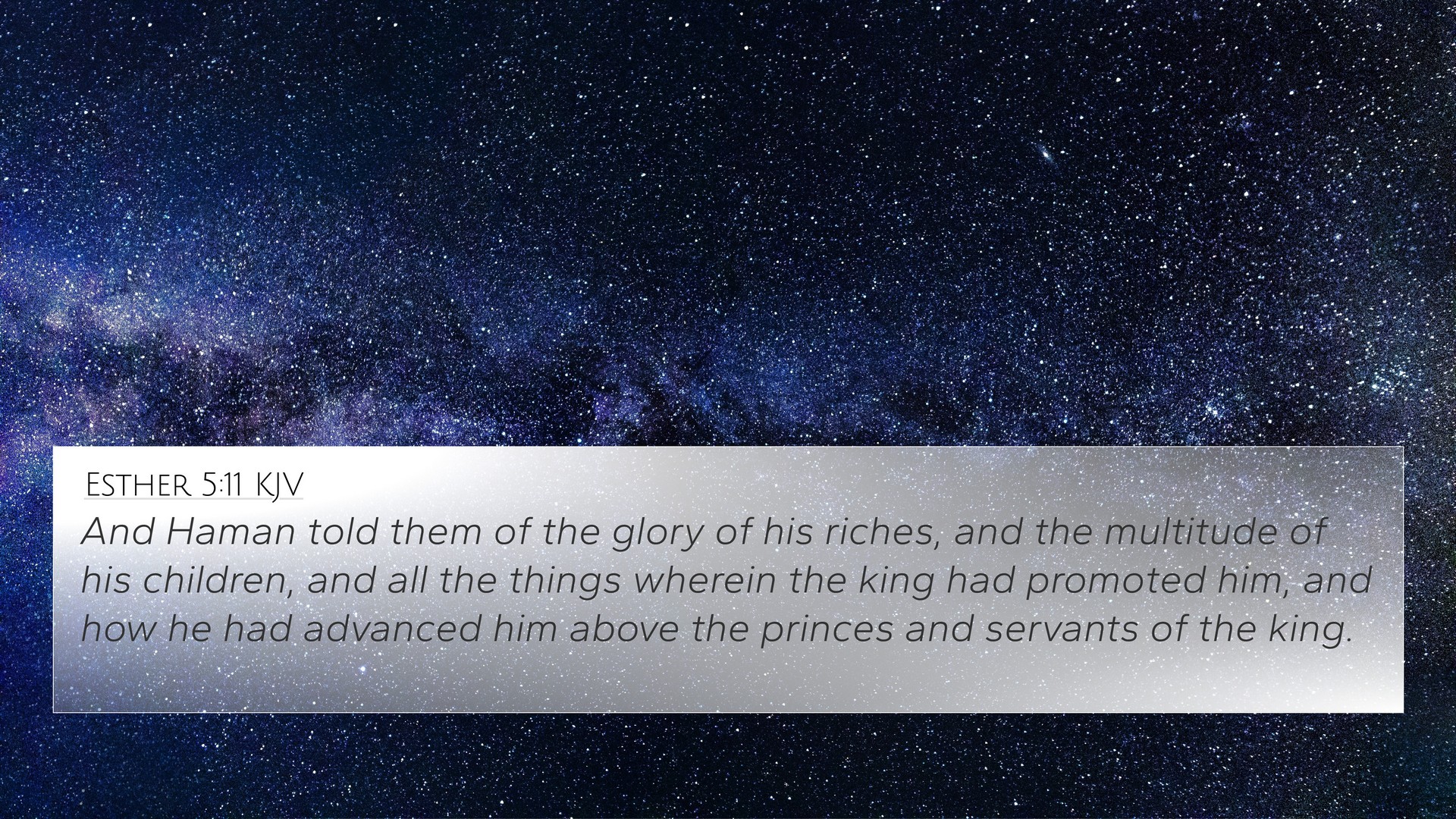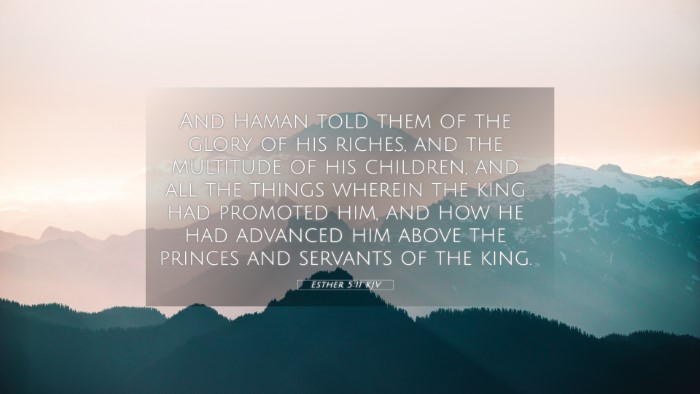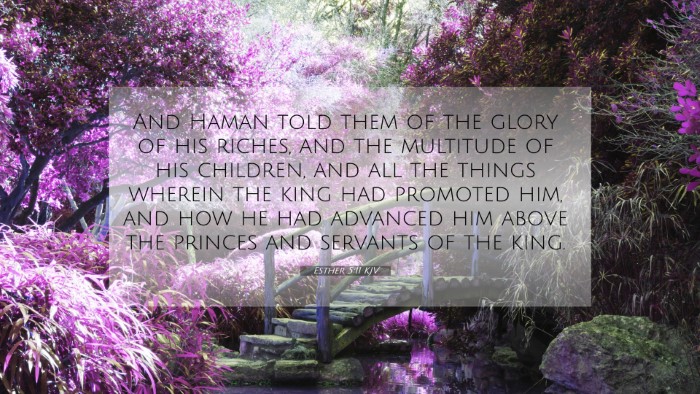Old Testament
Genesis Exodus Leviticus Numbers Deuteronomy Joshua Judges Ruth 1 Samuel 2 Samuel 1 Kings 2 Kings 1 Chronicles 2 Chronicles Ezra Nehemiah Esther Job Psalms Proverbs Ecclesiastes Song of Solomon Isaiah Jeremiah Lamentations Ezekiel Daniel Hosea Joel Amos Obadiah Jonah Micah Nahum Habakkuk Zephaniah Haggai Zechariah MalachiEsther 5:11 Similar Verses
Esther 5:11 Cross References
And Haman told them of the glory of his riches, and the multitude of his children, and all the things wherein the king had promoted him, and how he had advanced him above the princes and servants of the king.
Uncover the Rich Themes and Topics of This Bible Verse
Listed below are the Bible themes associated with Esther 5:11. We invite you to explore each theme to gain deeper insights into the Scriptures.
Esther 5:11 Cross Reference Verses
This section features a detailed cross-reference designed to enrich your understanding of the Scriptures. Below, you will find carefully selected verses that echo the themes and teachings related to Esther 5:11 KJV. Click on any image to explore detailed analyses of related Bible verses and uncover deeper theological insights.
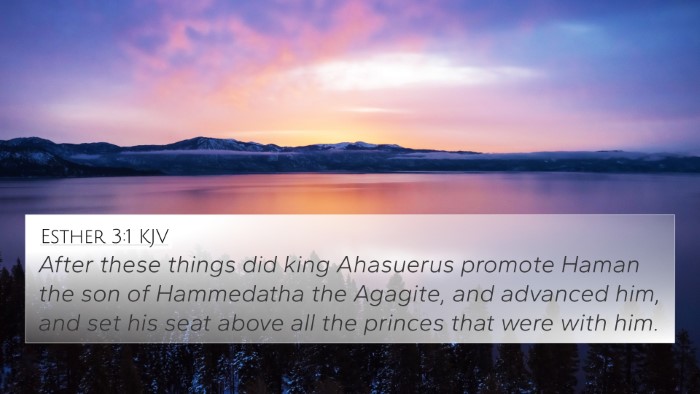
Esther 3:1 (KJV) »
After these things did king Ahasuerus promote Haman the son of Hammedatha the Agagite, and advanced him, and set his seat above all the princes that were with him.

1 Timothy 6:17 (KJV) »
Charge them that are rich in this world, that they be not highminded, nor trust in uncertain riches, but in the living God, who giveth us richly all things to enjoy;

Luke 12:19 (KJV) »
And I will say to my soul, Soul, thou hast much goods laid up for many years; take thine ease, eat, drink, and be merry.

Mark 10:24 (KJV) »
And the disciples were astonished at his words. But Jesus answereth again, and saith unto them, Children, how hard is it for them that trust in riches to enter into the kingdom of God!

Hosea 9:13 (KJV) »
Ephraim, as I saw Tyrus, is planted in a pleasant place: but Ephraim shall bring forth his children to the murderer.

Daniel 4:30 (KJV) »
The king spake, and said, Is not this great Babylon, that I have built for the house of the kingdom by the might of my power, and for the honour of my majesty?

Jeremiah 9:23 (KJV) »
Thus saith the LORD, Let not the wise man glory in his wisdom, neither let the mighty man glory in his might, let not the rich man glory in his riches:

Psalms 49:16 (KJV) »
Be not thou afraid when one is made rich, when the glory of his house is increased;

Psalms 49:6 (KJV) »
They that trust in their wealth, and boast themselves in the multitude of their riches;

Job 31:24 (KJV) »
If I have made gold my hope, or have said to the fine gold, Thou art my confidence;

Job 27:14 (KJV) »
If his children be multiplied, it is for the sword: and his offspring shall not be satisfied with bread.
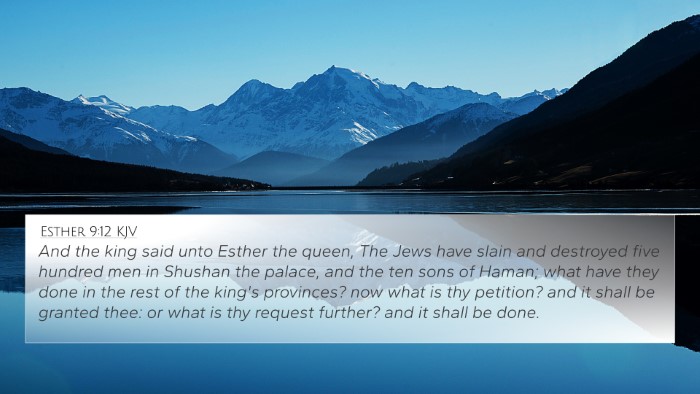
Esther 9:12 (KJV) »
And the king said unto Esther the queen, The Jews have slain and destroyed five hundred men in Shushan the palace, and the ten sons of Haman; what have they done in the rest of the king's provinces? now what is thy petition? and it shall be granted thee: or what is thy request further? and it shall be done.

Esther 1:4 (KJV) »
When he shewed the riches of his glorious kingdom and the honour of his excellent majesty many days, even an hundred and fourscore days.

Genesis 31:1 (KJV) »
And he heard the words of Laban's sons, saying, Jacob hath taken away all that was our father's; and of that which was our father's hath he gotten all this glory.
Esther 5:11 Verse Analysis and Similar Verses
Understanding Esther 5:11
Esther 5:11 states, "And Haman told them of the glory of his riches, and the multitude of his children, and all the things wherein the king had promoted him, and how he had advanced him above the princes and servants of the king."
Verse Overview
This verse showcases Haman's pride and boasts about his status in the Persian Empire. He recounts his wealth, family, and the position he holds, underscoring his desire for recognition and importance.
Key Themes
- Human Pride: Haman's overwhelming arrogance serves as a cautionary tale about the dangers of pride and self-exaltation.
- Wealth and Status: Haman’s fixation on material wealth and societal standing highlights the emptiness of such pursuits without humility.
- Danger of Favor: His promotion and favor with the king emphasize how quickly one's fortunes can change in the face of divine providence.
Bible Verse Cross-References
To fully grasp the implications of Esther 5:11, we can link it to several other verses in Scripture that illuminate similar themes:
- Proverbs 16:18: "Pride goes before destruction, and a haughty spirit before a fall."
- Ecclesiastes 5:10: "He who loves silver will not be satisfied with silver; nor he who loves abundance, with increase. This also is vanity."
- James 4:6: "But He gives more grace. Therefore He says: 'God resists the proud, but gives grace to the humble.'
- Luke 14:11: "For everyone who exalts himself will be humbled, and he who humbles himself will be exalted."
- Matthew 6:19-21: "Do not lay up for yourselves treasures on earth, where moth and rust destroy and where thieves break in and steal; but lay up for yourselves treasures in heaven..."
- 1 Timothy 6:9-10: "But those who desire to be rich fall into temptation and a snare, and into many foolish and harmful lusts which drown men in destruction and perdition."
- Proverbs 27:2: "Let another man praise you, and not your own mouth; a stranger, and not your own lips."
Interpretative Insights from Commentaries
Examining insights from historical and theological commentaries helps deepen our understanding of the dynamics at play in Esther 5:11:
Matthew Henry’s Commentary
Matthew Henry notes that Haman’s listing of his accomplishments and status reveals a heart devoid of humility. He illustrates how boasting, rather than bringing satisfaction, often leads to isolation and potential downfall, which contrasts with the biblical call for humility.
Albert Barnes’ Notes on the Bible
Barnes emphasizes that Haman is not merely recounting achievements but using them to assert his superiority over others in the court. This behavior can lead to bitterness among those he regards as inferior and lays the groundwork for his eventual downfall.
Adam Clarke’s Commentary
Clarke elaborates on the precarious nature of Haman’s pride, emphasizing that his self-satisfaction blinds him to the imminent danger posed by Mordecai’s refusal to honor him. This blindness will ultimately contribute to his tragic end, highlighting themes of justice and divine retribution.
Connections in Scripture
Esther 5:11 allows for interesting connections with various biblical themes, especially those revolving around pride, divine justice, and the dangers of seeking affirmation through earthly means:
- Pride and Humility: The Bible consistently contrasts pride with humility, calling believers to cultivate a spirit of servitude (see Philippians 2:3).
- God’s Sovereignty: Haman’s story links with the overarching theme of God’s control over human affairs, as seen throughout Scripture, especially in the story of Joseph (Genesis 50:20).
- The Downfall of the Wicked: Haman's fate is reminiscent of other biblical accounts of the downfall of the proud, including King Nebuchadnezzar (Daniel 4).
- Riches and Honor: The transient nature of wealth is illustrated through Haman's life, paralleling themes in the Book of Ecclesiastes.
Thematic Bible Verse Connections
Esther 5:11 serves as a gateway for deeper theological understanding through thematic Bible verse connections. The pride displayed by Haman- coupled with eventual outcomes- prompts discussion on numerous parallel themes found throughout both the Old and New Testaments:
- Nebuchadnezzar’s Pride: Link to Daniel 4, where King Nebuchadnezzar's pride leads to his downfall, echoing the themes present in Esther 5:11.
- David’s Humility: In contrast to Haman, David’s humility before God demonstrates the value placed on a humble heart (Psalm 51:17).
- The Oppression of the Righteous: Esther’s plight can be compared to that of other biblical figures who faced oppression, illuminating God’s faithfulness amid challenging circumstances (Psalm 37:24).
Applications and Lessons
In studying Esther 5:11, there are vital lessons and applications for contemporary believers:
- Recognize the leads of pride and avoid self-exaltation.
- Acknowledge that earthly status is fleeting and does not reflect worth.
- Foster relationships grounded in humility and service to others.
- Understand the ramifications of self-centered ambition in light of God’s sovereignty.
Conclusion
Esther 5:11 serves as a profound reminder of the dangers of pride and the fleeting nature of worldly recognition. Through careful examination of this verse and its connections, we gain insight into the moral and theological dimensions of humility, divine justice, and the transient nature of worldly success.
Further Cross-Referencing Biblical Texts
Utilizing tools for Bible cross-referencing can deepen understanding and provide clarity on the interconnected themes in Scripture, helping believers navigate their journeys with wisdom and discernment.
